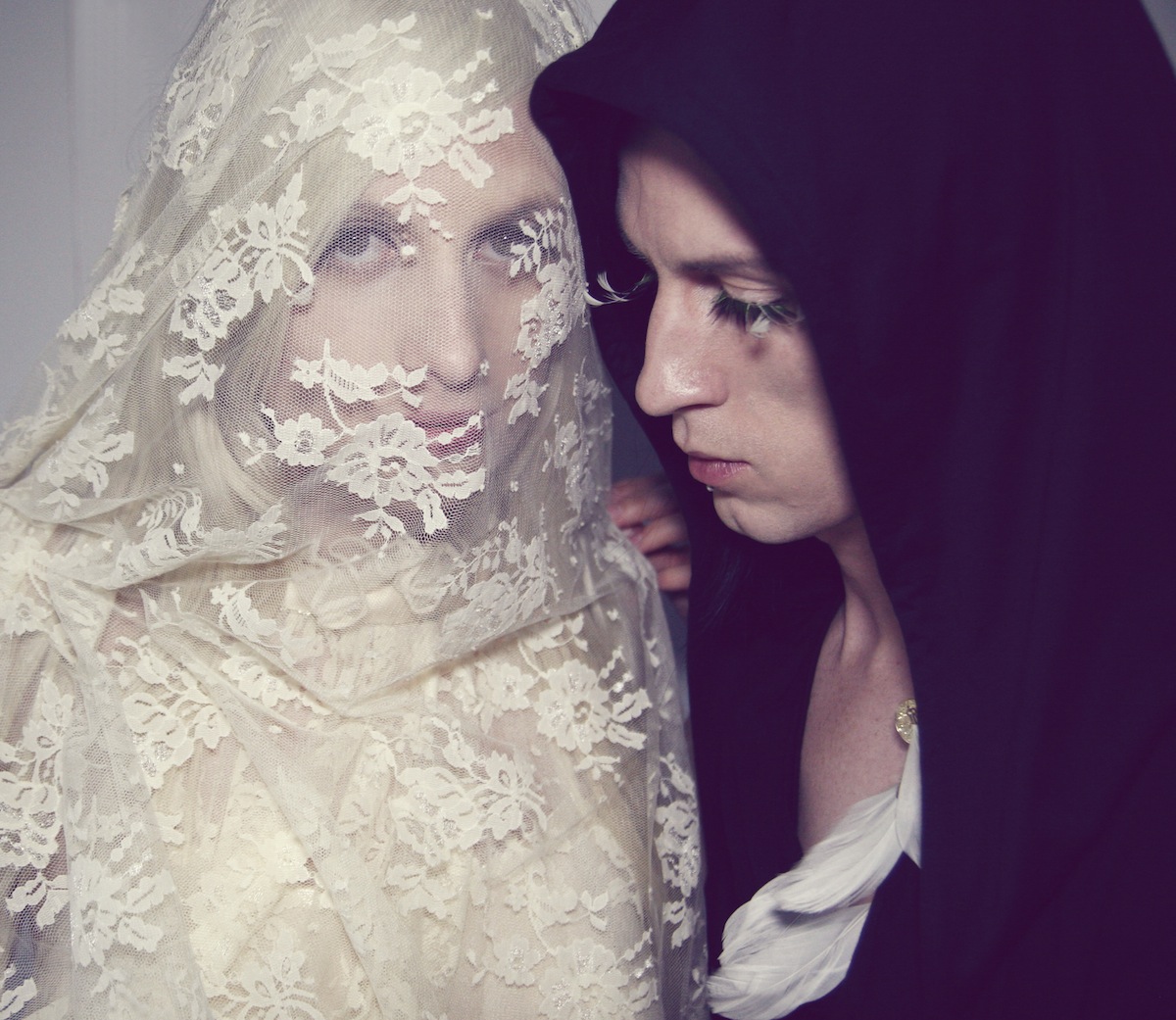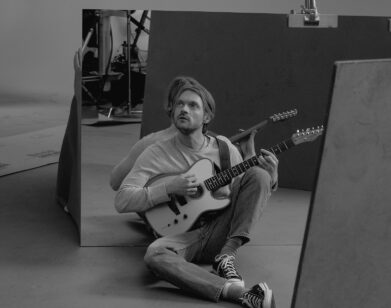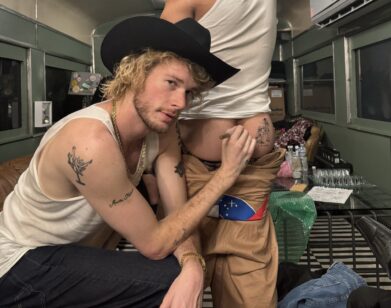Exclusive Song Premiere and Interview: ‘Rocket and the Crow,’ The Deer Tracks

ABOVE: THE DEER TRACKS.
They may both hail from Gävle, Sweden, but at first listen there are miles between The Deer Tracks (David Lehnberg and Elin Lindfors) and Caviare Days (sisters Lina and Maja Westin). Where Caviare Days trade in down-and-dirty garage-rock stomps with a psychedelic sheen, The Deer Tracks’ ethereal trilogy The Archer inhabits another time and place altogether. Forest-creatures-meet-bar-culture? Perhaps.
Additional listens peel away the superficial differences. Still ostensibly on different sides of the musical spectrum, The Deer Tracks and Caviare Days are united by a relentless passion and drive for self-expression. Or as Maja Westin succinctly put it, both bands operate “from the guts.”
Maja Westin joined Interview for a conversation with Caviare Days about the creative process, odd and unusual spaces, and the art of forging a musical language. We’re also pleased to premiere The Archer b-side “The Rocket and the Crow,” which you can stream below.

ELIN LINDFORS: I remember meeting you and Lina at the bus. It was summer, a year ago. You had just got the record deal, I think. You had some kind of deal and you were getting to start with Caviare Days. I remember it was such a warm summer’s day. It was unusual for Sweden. You looked so pretty, as always. I was so excited for you. I hadn’t heard your music before, because you had just started. But I was so happy for you. And then I checked out your music and it was great.
MAJA WESTIN: It’s hard to remember sometimes. Where we come from, a lot of people are making music. You and David started six or seven or eight years ago.
DAVID LEHNBERG: Five.
LINDFORS: Separately.
WESTIN: How did you two get together to form Deer Tracks?
LINDFORS: I had a release party for an album with a former band. David came to the show. The funny part is that our minds have been working so much together that they’re kind of synchronized. But I think it worked like that from the beginning because I remember listening to David’s album before meeting him. I was thinking that I should put some backup vocals on his voice because I felt like it was a perfect match. Then he asked me if I could put some backup vocals on his next record. That’s how we met.
LEHNBERG: Yeah, it’s crazy.
WESTIN: Well it’s supposed to be natural, forming a band. Or whatever you want to call it. Sometimes it’s just a band. Or a project. Or a way of life. It depends.
LINDFORS: Yeah. But you and Lina have always probably been making music together as sisters. You’re so talented. Your father was my guitar teacher.
WESTIN: [laughs] It’s funny. He’s been teaching a lot. A lot of the people who are making music in Gävle are in some way related to what he’s been doing. Which is kind of nice. With Lina and me, I think both of us actually denied our interest in music and art for a period. We focused too much on other academic careers for a while. We didn’t see each other for five years or so. We saw each other, but we didn’t hang out. We didn’t call each other like we do today. Suddenly, we both felt a strong urge that we just had to get away from Sweden and make music. She was able to quit her job, and I was quitting school. Then we went to New York. After that, we’ve been working really hard with Caviare Days. Before that, we didn’t even talk to each other for a really long time. For us, it was a way of getting back to our roots, and getting back to something that we felt we had lost. I was really doing a lot of academic studies and lost myself in spatial planning and engineering kind of stuff. It wasn’t my calling in life.
LEHNBERG: That’s the universe’s way of course correcting.
WESTIN: In a way, you’re just a slave to some kind of fate that leads you to places. Sometimes it’s really smooth, and sometimes it’s just a pain in the ass, questioning why you’re still doing something. It’s a bumpy road, but I enjoy it most of the time.
LINDFORS: It’s always going to be a bumpy road.
WESTIN: How has 2012 been for you guys? Do you feel like you’ve been developing into something bigger?
LEHNBERG: Yeah. Just now when I’ve been thinking about it, we’ve been doing so many things, it’s crazy. So many fun things, so many cool things. We’ve recorded; we’ve been on tour. We’ve been working every day for the whole year. It’s been crazy and great.
WESTIN: That’s wonderful! I’ve been thinking some times in Gävle, how you’re still coping with living there. Obviously I love where I come from, but sometimes I feel like I could never live there. But you keep yourself occupied with something all the time. It’s a different thing.
LINDFORS: I imagine that if I were to live in Stockholm like you do, I would have a hard time focusing on creating music. When nothing happens around me, I get creative. I get bored and then, “Oh, what can I do? I need to do something.” But if I go see a show every night, and go see my favorite bands play all the time, I wouldn’t get anything done.
LEHNBERG: Yeah. And I would end up at some bar all the time. [laughs]
WESTIN: I guess you’re right. I think that’s what we need to do right now. To go some place and really isolate ourselves from everything that’s going on.
LINDFORS: It is really funny, because we are from the same town and we haven’t hung out that much. We went to the same school and everything. We practically grew up in the same village. I find it very inspiring to go back there, where I grew up in this tiny village. We’ve been recording in a cabin, and that was just wow—the best thing ever. Would you feel comfortable doing that, if you needed some distance from the capital?
WESTIN: Yeah. Absolutely. In the beginning I was living in Gävle for a while. Until I moved to Stockholm. I remember being really bored, but also accomplished a lot of things. I painted a lot. I also wrote all the songs. And I vacuumed. That’s what I want to do right now. Things are happening in Stockholm every day. It’s the capital city, of course. It’s a sport just to say no to going out. Of course you’re having fun, but there’s a part of you that’s really sad about the fact that you’re not creating as much as you would like to. But I do things in periods. Right now, I’m just focusing on getting things around and getting gigs and spreading the word. I strongly feel that we have to go back to the creative part. Even more.
LEHNBERG: For us it’s the other way around! We need to get out more and do stuff. We’re locked up in our studio.
WESTIN: Maybe we should switch places.
LINDFORS: Yeah. Switch personalities.
WESTIN: The Eggegrund thing, I think for people not living in Sweden, I think it would be the most exotic thing to read about. I saw that there’s the video of a making of a song. That must be really exotic for people not from the north. Just trying to live through you and living on this tiny island. It’s some kind of fairytale.
LEHNBERG: It was like a fairytale when we went there. It’s not often you get to record in a lighthouse. It’s a crazy thing. It was exotic for me!
WESTIN: Maybe they think it’s just an everyday routine for you. People on the other side of the world might think that you do that all the time.
LEHNBERG: For us, it’s been really important to find places that is connected with something. We built our new studio in a pasta factory that is haunted by ghosts that are turning off lamps and slamming the doors. It affects you and brings something to the music.
WESTIN: Yeah. We need places where we feel like our imagination gets way ahead of us. Where we get carried away.
LINDFORS: I can’t see us going to a regular studio. A big fancy studio and doing something. That would be just terrible.
WESTIN: In a way, I think that we are a bit the same. We have the whole world. We have to go to New York or whatever. We would really win if we just thought that we could do something else within 20 miles instead of having to go to a different part of the world. That costs money. It’s really important to surround yourself with a creative, odd place where your thoughts bounce differently.
LINDFORS: I’m sure that New York was so creative for you as well, because that’s where you studied.
WESTIN: In a way. But New York is also like Stockholm where it’s happening, with too many things. It’s more like filling up a library of experiences, and then you bring them back and put them in your music. While you’re there, if you’re only there for three months, it’s the same as here. It’s really hard to sit down and focus on finishing ideas. You gather ideas. And good experiences. Isolation is good for every type of creative work. Many people would agree that they would go to a cabin and lock themselves in to get into the zone.
LINDFORS: But you also have to bring something to write about. If you don’t have a crazy imagination and get wrapped up in your head it can be difficult. But I can see that you have to get new impressions and meet different kinds of people and experience different cultures and get some different rhythms in your life.
WESTIN: Sometimes you’re over-inspired and you feel really frustrated because you can’t let it all out. I do have a lot of things I want to do and a lot of inspiration.
LINDFORS: What’s stopping you?
WESTIN: Right now I’m studying. I’m doing my major in fashion studies. I’ve been studying a lot on the side. I’m now able to finish it all. I’m doing my last big essay. It’s good. I get a lot of ideas from reading things. It gives me language. When I’m writing in English, it’s good to keep it up in my head and really improve my vocabulary.
LEHNBERG: That’s why we make up words, because we don’t have a vocabulary. We use crazy chants instead!
WESTIN: I’ve been listening to some of your tracks today. Sometimes you throw in a Swedish line in an English song. It’s really powerful because I can imagine somebody not from Sweden hearing that and thinking of Lord of the Rings or something.
LEHNBERG: When you can’t find a word that expresses what you want to say, you make up a word that just brings all of that into the word.
WESTIN: Why not? As long as you yourself know what the word means and communicate that, it’s going to be as powerful as any word.
LEHNBERG: Exactly. So if we can’t find a word, we make it up.
LINDFORS: Sometimes the voice has two tasks. It can tell a story and it’s also an instrument. Sometimes you just want to be an instrument. You don’t want to do it all. You just want to be free. I’m not going to be a messenger here; I want to be an instrument.
WESTIN: I’m also quite fond of sounds that don’t have to do with words or meaning as well. Murmuring or something that you bring from the guts. I like making really dark sounds. [growls] Sometimes that really messes up your voice for the other parts of the song. I get carried away.
LINDFORS: You and Lina, you sing a lot together. At the same time. Do you feel more comfortable doing that? Do you feel alone when you sing on your own?
WESTIN: As much as I like singing in harmonies, I don’t like when I’m controlled. If you sing in harmonies, you have a set pattern as to how you’re supposed to sing. You can’t deviate too much from the form. Sometimes I don’t really like singing in harmonies. But there are times when you hear that there is a third voice coming out of the two voices coming together. I think that’s really powerful. Of course, it brings some kind of union between us. As sisters and as people. It’s just nice having that kind of harmony with anyone.
LINDFORS: Would you like to do a performance on your own in the future?
WESTIN: I think every person wants to have a part of themselves expressed. I’m not complaining about how it is now. I really like the way it is structured now. When we sing onstage, sometimes I can rest for a bit. When she sings her parts, I get to do a lot of dancing. And then we sing together.
LEHNBERG: You’re not resting, you’re dancing!
WESTIN: Onstage, I think you lose the concept of pain. If you’re sick or anything, you go onstage and it’s gone. Then you go offstage and it comes back. It’s a half world where everything’s different. It’s like being on the moon, maybe.
LINDFORS: Yeah, I can relate to that.
WESTIN: I do a lot of neck dancing. I should be in a heavy metal band, maybe.
LINDFORS: They could bring you on tour.
WESTIN: And I could just stand there! Be a go-go hair-flinging girl.
LINDFORS: Did you just play on a bus recently?
WESTIN: Yes! It reminded me a gig that we did on a boat in Hamburg two months ago. It was almost the same thing. Every type of venue that isn’t the usual type of rock club is really funny. But when it’s a vehicle and it’s moving, it’s even funnier. It’s like being on a roller coaster or something. The boat was really rocking because they took it out for a little trip around the harbor. It was really crammed with people and lots of lights. The sound was so good. It was better than many of the rock clubs that we’ve been to. It was one of the best experiences of our careers.
LINDFORS: It’s always great to play at unexpected locations. We had a gig last summer down in a mine. It was so cool. 100 meters down. It was in the middle of the summer, but it was freezing. It was ice. So cold down there!
LEHNBERG: The natural reverb was like a thousand cathedrals at once. It was like, “BOOM!”
WESTIN: Some places just provide you with a better sound. It’s lovely. Maybe we should build a boat. We could go during the summer time on the east coast. We can go north. We can go to Finland.
LINDFORS: Yeah. We can just build a big boat. We can have our own studios there, and apartments, and just travel around the world.
WESTIN: Like Noah’s ark.
LEHNBERG: Yeah!
THE DEER TRACKS’ NEW ALBUM THE ARCHER TRILOGY PT. 3 IS OUT FEBURARY 12 VIA THE CONTROL GROUP. FOR MORE INFORMATION ABOUT THEM, VIST THEIR FACEBOOK PAGE. CAVIARE DAYS’ SELF-TITLED DEBUT IS OUT NOW. FOR MORE INFORMATION, VISIT THEIR FACEBOOK PAGE.






